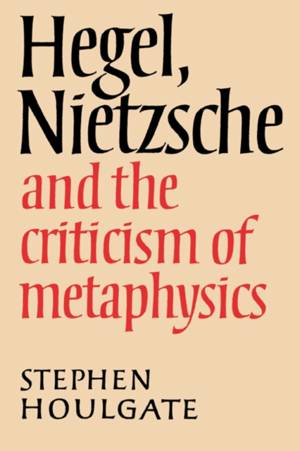
- Afhalen na 1 uur in een winkel met voorraad
- Gratis thuislevering in België vanaf € 30
- Ruim aanbod met 7 miljoen producten
- Afhalen na 1 uur in een winkel met voorraad
- Gratis thuislevering in België vanaf € 30
- Ruim aanbod met 7 miljoen producten
Zoeken
€ 96,95
+ 193 punten
Omschrijving
This study of Hegel and Nietzsche evaluates and compares their work through their common criticism of the metaphysics for operating with conceptual oppositions such as being/becoming and egoism/altruism. Dr Houlgate exposes Nietzsche's critique as employing the distinction of Life and Thought, which itself constitutes a metaphysical dualism of the kind Nietzsche attacks. By comparison Hegel is shown to provide a more profound critique of metaphysical dualism by applying his philosophy of the dialectic, which sees such alleged opposites as defining components of a dynamic. In choosing to study a theme so fundamental to both philosophers' work, Houlgate has established a framework within which to evaluate the Hegel-Nietzsche debate; to make the first full study of Nietzsche's view of Hegel's work; and to compare Nietzsche's Dionysic philosophy with Hegel's dialectical philosophy by focusing on tragedy, a subject central to the philosophy of both.
Specificaties
Betrokkenen
- Auteur(s):
- Uitgeverij:
Inhoud
- Aantal bladzijden:
- 320
- Taal:
- Engels
Eigenschappen
- Productcode (EAN):
- 9780521892797
- Verschijningsdatum:
- 29/01/2004
- Uitvoering:
- Paperback
- Formaat:
- Trade paperback (VS)
- Afmetingen:
- 153 mm x 230 mm
- Gewicht:
- 480 g

Alleen bij Standaard Boekhandel
+ 193 punten op je klantenkaart van Standaard Boekhandel
Beoordelingen
We publiceren alleen reviews die voldoen aan de voorwaarden voor reviews. Bekijk onze voorwaarden voor reviews.











